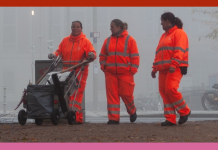Caroline Day from Wellbeing Dynamics discusses her thoughts on enabling working carers to look after a loved one
1 in 8 people (6.5 million) are affected, Panorama is on the case and the situation is dire. I’m talking about being a carer for a loved one! Many of these carers need or want to work – and that gives employers a complex problem. How to support them in a way that also protects the business.
The trouble is that the word carer is used generically – but there are very different sorts of care. For example, I looked after my father until he was 94 and he was totally obliging and grateful at all times for every bit of help he received. A delight to look after, the only problem was organising everything so that his schedule worked with mine. But recently, I spoke with a carer who’d had to give up work because her mother has vascular dementia with challenging behaviour; she can be abusive for hours at a time. Very different situation. Very different pressures.
But, there’s a huge swathe of employees whose parent’s need a bit of help to stay independent. Their parents are starting to be infirm and just beginning to need help with things like shopping, lawn mowing, DIY etc. It’s manageable and work is hardly affected.
Over time, they need a bit more help; perhaps now they need a visit every day to give them their supper. That involves extra shopping and cooking and getting there on time (parent gets anxious) which can mean missing important meetings at work that run over. By now, the employee is becoming exhausted, working all day and caring in the evening. And if they also have children there an additional concern about the family feeling neglected!
The difficulty arises when they become conflicted by the process. Effectively, they’re trying to do a good job in three different environments. They really are the ham in the Sandwich of Life!
This can go on for years and sometimes people have no choice but to give up work. But these are valuable members of staff that are difficult to replace. It would be so much easier if they could be helped to fulfil all roles to their satisfaction – and actually, it’s relatively simple.
I’ve spent the last 30 years helping people cope with difficult situations at work; from dealing with abuse at work to issues, such as bullying. These are the same skills that are needed to cope with the caring issue.
Resourcefulness
I define this skill as the ability to know what to do and the bravery to carry it through. In a difficult situation, being able to draw on inner resources provides enormous opportunity to try something out and if it doesn’t quite work the first time, do it differently. This is useful for work too.
Inner strength and resilience
Some people have the ability to do five things and thrive, other people do one thing and fall over. Resilience is sometimes referred to as the level of bounce-back-ability. The strength to go through a challenge here and then go on to another challenge there with no cross-fertilisation of thoughts between the two is an immeasurable skill.
Inner conflict
The person wants to be successful at work but feels torn with concern for their parent. This depletes energy and can leave them floundering. But actually, it’s no longer the job or the caring that’s the problem; it’s the internal conflict of feeling they need to be in two places at the same time. Resolving this conflict restores their energy and gives them the freedom to manage better.
Personal Wellbeing
A pre-requisite of being a useful carer is that the person looks after their own wellbeing. It’s so important to keep the batteries charged. Giving yourself permission to look after yourself and putting the steps in place that need to be there, is a vital piece of the puzzle.
What can you expect?
You can expect staff to be no longer conflicted by working and caring, instead managing both environments with clarity and authority. Retaining their identity as a working professional allows them to make better choices that respect themselves and their employer. Continually recharging their batteries allows them to deliver on all fronts.
But more than that, it gives employers a highly motivated workforce who appreciates the opportunity to both work and care for their loved ones.
Information on the workshop Enabling Working Careers is available on our website:











